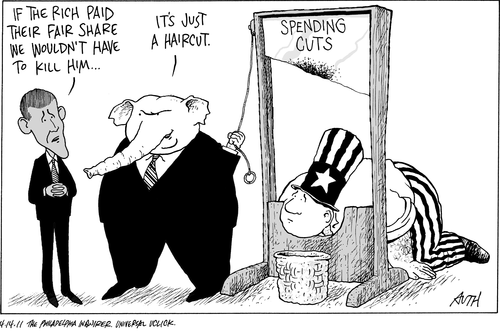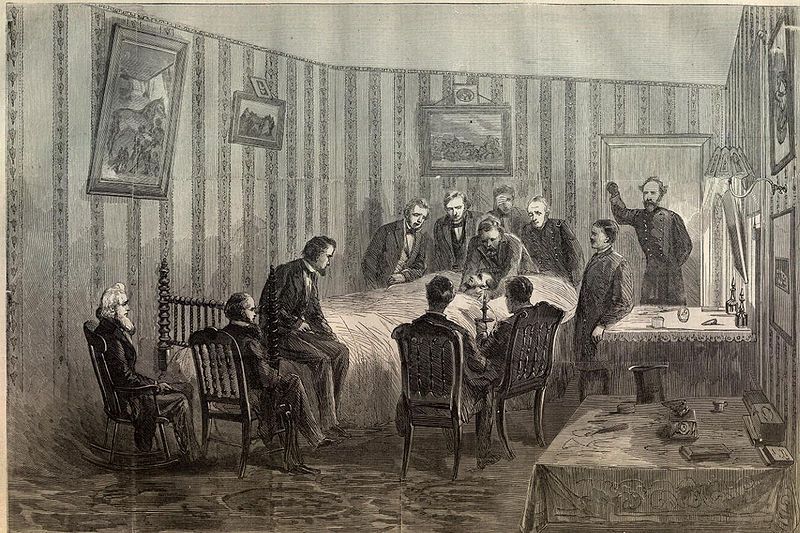“Punting the Pundits” is an Open Thread. It is a selection of editorials and opinions from around the news medium and the internet blogs. The intent is to provide a forum for your reactions and opinions, not just to the opinions presented, but to what ever you find important.
Thanks to ek hornbeck, click on the link and you can access all the past “Punting the Pundits”
In case you wonder what her real name is
 Heather “Digby” Parton: DC’s deficit frenzy
Heather “Digby” Parton: DC’s deficit frenzy
The entire political world has descended into a deficit frenzy that rivals the mass hysteria of the Salem witch trials. The mania has been growing for months, but exploded last week when D.C. heartthrob Rep. Paul Ryan of Wisconsin (R) unveiled what was widely received as the most important document since the Emancipation Proclamation and the entire political establishment started babbling about “brio” and “courage.”
Nothing else matters at this point – not anemic economic growth, not sustained, shockingly high unemployment, not a Middle East uprising of world-changing consequence – not even an epic nuclear catastrophe.
Robert Reich: President Obama’s Real Proposal (And Why It’s Risky)
Paul Ryan says his budget plan will cut $4.4 trillion over ten years. The President says his new plan will cut $4 trillion over twelve years.
Let’s get real. Ten or twelve-year budgets are baloney. It’s hard enough to forecast budgets a year or two into the future. Between now and 2022 or 2024 the economy will probably have gone through a recovery (I’ll explain later why I fear it will be anemic at best) and another downturn. America will also have been through a bunch of elections – at least five congressional and three presidential.
The practical question is how to get out of the ongoing gravitational pull of this awful recession without cow-towing to extremists on the right who think the U.S. government is their mortal enemy. For President Obama, it’s also about how to get reelected.
In December, President Obama signed legislation to extend hundreds of billions of dollars in Bush tax cuts, benefiting the wealthiest Americans. Last week, Obama agreed to billions of dollars in cuts that will impose the greatest burden on the poorest Americans. And now, virtually everyone in Washington believes, the President is about to embark on a path that will ultimately lead to some type of reductions in Social Security, Medicare and/or Medicaid benefits under the banner of “reform.” Tax cuts for the rich — budget cuts for the poor — “reform” of the Democratic Party’s signature safety net programs — a continuation of Bush/Cheney Terrorism policies and a new Middle East war launched without Congressional approval. That’s quite a legacy combination for a Democratic President.
All of that has led to a spate of negotiation advice from the liberal punditocracy advising the President how he can better defend progressive policy aims — as though the Obama White House deeply wishes for different results but just can’t figure out how to achieve them. Jon Chait, Josh Marshall, and Matt Yglesias all insist that the President is “losing” on these battles because of bad negotiating strategy, and will continue to lose unless it improves. Ezra Klein says “it makes absolutely no sense” that Democrats didn’t just raise the debt ceiling in December, when they had the majority and could have done it with no budget cuts. Once it became clear that the White House was not following their recommended action of demanding a “clean” vote on raising the debt ceiling — thus ensuring there will be another, probably larger round of budget cuts — Yglesias lamented that the White House had “flunked bargaining 101.” Their assumption is that Obama loathes these outcomes but is the victim of his own weak negotiating strategy.
Jon Walker: Obama’s Budget Promises on Bush Tax Cuts, Drug Price Negotiation Ring Hollow
The deficit reduction plan President Obama vaguely outlined yesterday lacks basic credibility. The problem isn’t that the math doesn’t add up-it is at least a dramatic improvement over Republican Paul Ryan’s plan, which literally defies logic and basic math. This issue is that many of the reductions President Obama promised yesterday come from actions that he has been promising for years, yet when the opportunity came up to fulfill them, he actively violated his word.
In the speech, Obama again promised huge deficit reductions from both letting the Bush tax cuts expire for those making over $250,000, and fixing Medicare Part D by allowing Medicare to directly negotiate for lower drug prices. We are supposed to believe he will fight for these despite having laid down on both before.
Katrina vanden Heuvel: Fighting for a People’s Budget
On Wednesday, President Obama spoke in eloquent language of our social contract, of a progressive patriotism, and of a role for government that helps us “do together what we cannot do as well for ourselves.” It was a clear rebuke to the GOP’s Robin Hood in Reverse agenda-taking from the poor and middle-class in order to preserve tax breaks for corporations and the wealthiest Americans.
Obama made the right choice in defending Social Security, Medicare, and Medicaid, and pushing instead for healthcare reform-even putting negotiating drug prices on the table. He again refused to renew the Bush tax cuts for the wealthy-a pledge he has made and broken in the past. He also called for cuts in a defense budget that has contributed 2 out of 3 dollars in increased discretionary spending since 2001
Mike Lux: It’s All One Story
I’m going to comment on the President’s budget speech in a minute, but first I want to highlight something happening on Capitol Hill today that really ties together the Republican governing philosophy.
There is a certain rich irony in Darrell Issa bringing Wisconsin Gov. Scott Walker to the Capitol for a hearing on how Moody’s has boosted Wisconsin’s credit rating because of the union busting measures Walker has been pushing in the state. So in one sentence, you have a leader of the House Republicans that are trying to do away with Medicare and Medicaid, the governor who most personifies the attempt to crush collective bargaining in this country, and one of the principal companies at the dead center of the fraud on Wall Street that brought down the world economy. They should take their show on the road. You could entitle it “Cruelty, Arrogance, and Fraud: How to Dismantle the American Middle Class in Three Easy Steps.”
Issa, Walker, and Moody’s belong together. This is all one story – the story of a relentless assault on the working middle class and those desperately trying to gain a foothold on the ladder up to it.
Johann Hari]: This royal frenzy should embarrass us all
Republicans are not the Grinch, trying to ruin the ‘big day’ for William and Kate. We are proposing a positive vision
Okay, let’s cut a deal here. If Britain can afford to spend tens of millions of pounds on the royal wedding, we have to spend an equal amount distributing anti-nausea pills across the land – to all of us who can’t bear to see our country embarrass itself in this way. Don’t let the Gawd-bless-you-ever-so-‘umbly-yer-Majesty tone of the media coverage fool you. Most British people are benignly indifferent to the wedding of William Windsor and Kate Middleton. The 20 percent of us who are republicans, like me, have it slightly worse. We will suffer that face-flushing, stomach-shriveling embarrassment that strikes when somebody you love – your country – starts to behave in a deeply weird way in a public place.
Of course, when two people get married, it’s a sweet sight. Nobody objects to that part. On the contrary: republicans are the only people who would let William Windsor and Kate Middleton have the private, personal wedding they clearly crave, instead of turning them into stressed-out, emptied-out marionettes of monarchy that are about to jerk across the stage. We object not to a wedding, but to the orgy of deference, snobbery, and worship for the hereditary principle that will take place before, during and after it.


 The actor Kathy Bates, who portrayed Margaret “Molly” Brown in the movie Titanic, bears an uncanny resemblance to Margaret Brown.
The actor Kathy Bates, who portrayed Margaret “Molly” Brown in the movie Titanic, bears an uncanny resemblance to Margaret Brown. Will there be another “cave exploration by our Spelunker-in-Chief? Despite President Obama speech on Wednesday and his
Will there be another “cave exploration by our Spelunker-in-Chief? Despite President Obama speech on Wednesday and his 

 E.J. Dionne Jr.:
E.J. Dionne Jr.: 
Recent Comments